- Home
- Tahereh Mafi
Believe Me Page 3
Believe Me Read online
Page 3
“What do you need, Kishimoto?” I ask unkindly. “I’m not interested in your company.”
His responding pain is loud; it glances off my chest, leaving a vague impression. This pathetic new development fills me with shame. I desperately don’t want to care, and yet—
Ella adores this idiot.
I come to a sudden stop on the path. The dog bumps my legs, wagging its tail violently before barking again. I take a deep breath, stare at a tree in the distance.
“What is it you need?” I ask again, this time gently.
I feel him frown as he processes his feelings. He doesn’t look at me when he says, “I just wanted to tell you that I got it.”
I stiffen at that, my body activating with awareness. I pivot fully to face him. Suddenly, Kenji Kishimoto appears to me vividly rendered: his tired eyes, his tanned skin, his heavy, sharp black brows—and his hair, in desperate need of a cut. There’s a bruise fading along his temple, his left hand wrapped in gauze. I hear the rattle of leaves and spot a squirrel, darting into a bush. The dog goes berserk.
“You got what?” I say carefully.
“Oh, now you’re interested?” He meets my eyes, his own narrowed in anger. “Now you’re going to look at me like I’m a human being? You know what? Fuck this. I don’t even know why I do shit for you.”
“You didn’t do it for me.”
Kenji makes a sound of disbelief, looking away before looking back at me. “Yeah, well, she deserves to have a nice ring, doesn’t she? You miserable piece of shit. Who proposes to a girl without a ring?”
“I might remind you that you are in no position to exercise moral superiority,” I say, my voice growing lethal even as I will myself to remain calm. “Having destroyed her wedding dress.”
“That was an accident!” he cries. “Yours was an oversight!”
“Your very existence is an oversight.”
“Oh, wow.” He throws up his hands. “Ha ha. Very mature comeback.”
“Do you have it or not?”
“Yeah. I do.” He shoves his hands in his pockets. “But, you know, now I’m thinking I should just give it to her myself. After all, I was the one who did all of this for you. I was the one who asked Winston to sketch your design. I was the one who found someone to make the goddamn thing—”
“I was not going to leave the grounds while she was lying in a hospital bed,” I say, so close to shouting that Kenji visibly startles. He steps back, studies me a moment.
I neutralize my expression, but too late.
Kenji loses his anger as he stands there, softening as he stares at me. I experience nothing but rage in response.
He never seems to understand. It’s his constant pity— his sympathy, not his stupidity—that makes me want to kill him.
I take a step forward, lower my voice. “If you are idiotic enough to think I will allow you to be the one to give her this wedding ring, you have clearly underestimated me. I might not be able to kill you, Kishimoto, but I will devote my life to making yours a palpable, never-ending hellscape.”
He cracks a smile. “I’m not going to give her the ring, man. I wouldn’t do that. I was just messing with you.”
I stare at him. I can hardly speak for wanting to throttle him. “You were just messing with me? That was your idea of a joke?”
“Yeah, okay, listen, you are way too intense,” he says, making a face. “Juliette would’ve thought that was funny.”
“You clearly don’t know her very well if you think so.”
“Whatever.” Kenji crosses his arms. “I’ve known her longer than you have, asshole.”
At this, I experience an anger so acute I think I might actually kill him. Kenji must see this, because he backpedals.
“No—you’re right,” he says, pointing at me. “My bad, bro. I forgot about all the memory-wiping stuff. I didn’t mean that. I only meant, like— I know her, too, you know?”
“I’m going to give you five seconds to get to your point.”
“See? Who says stuff like that?” Kenji’s brows furrow; his anger is back. “What does that even mean? What are you going to do to me in five seconds? What if I don’t even have a point? No—you know what, I do have a point. My point is that I’m sick of this. I’m sick of your attitude. I’m sick of making excuses for your crappy behavior. I really thought you’d try to be cool for J’s sake, especially now, after everything she’s been through—”
“I know what she’s been through,” I say darkly.
“Oh, really?” Kenji says, feigning surprise. “So then maybe you already know this, too”—he makes a dramatic gesture with his hands—“news flash: she’s, like, a genuinely nice person. She actually gives a shit about other people. She doesn’t threaten to murder people all the time. And she likes my jokes.”
“She’s very charitable, I know.”
Kenji exhales angrily and looks around, searching the sky for inspiration. “You know, I’ve tried, I really have, but I just don’t know what she sees in you. She’s like—she’s like sunshine. And you’re a dark, violent rain cloud. Sun and rain don’t—”
Kenji cuts himself off, blinking.
I walk away before the realization hits him. Nothing is worth listening to him finish that sentence.
“Oh my God,” he says, his voice carrying. “Oh my God.”
I pick up speed.
“Hey— Don’t walk away from me when I’m about to say something awesome—”
“Don’t you dare say it—”
“I’m going to say it, man. I have to say it,” Kenji says, jumping ahead of me on the path. He’s walking backward now, grinning like an idiot.
“I was wrong,” he says, making a crude heart shape with his hands. “Sun and rain make a rainbow.”
I come to a sudden halt. For a moment, I close my eyes.
“I want to throw up now,” Kenji says, still smiling. “Really. Actual vomit. You disgust me.”
I’m able to manufacture only mild anger in response to this slew of insults, as the feeling dissipates in the face of irrefutable evidence: Kenji’s words belie his emotions. He’s genuinely happy for us; I can feel it.
He’s happy for Ella, in particular.
I experience a pang at that, at the love and devotion she’s inspired in others. It’s a rare thing to find even a single person who desires your unqualified joy; she has found many.
She’s built her own family.
I exist on the outskirts of this phenomenon: hyperaware that I eclipse her light with my darkness, worried always that she will find me wanting. These relationships mean a great deal to her; I have long known this, and I have tried, for her sake, to be more social. To be nicer to her friends. I don’t protest when she asks to gather with the others; I no longer suggest that we take our meals alone together. I follow her around, sitting quietly beside her as she talks and laughs with people whose names I struggle to remember. I watch her bloom in the company of those she cares about, all while I try to drown out their voices, to kill the noise in my head. I worry, constantly, that despite my efforts, I will not be able to be what she wants.
It’s true; I am insufferable.
I wonder whether it is only a matter of time before Ella discovers this fact for herself.
Subdued, the fight leaves my body.
“Either give me the ring or leave me alone,” I say, hearing the exhaustion in my voice. “Nouria and Castle are waiting for me.”
Kenji registers the change in my tone and switches gears, activating in himself a rarely witnessed solemnity. He looks at me for longer than I am comfortable before reaching into his pocket, from which he withdraws a dark blue velvet box.
This, he holds out to me.
I experience an unsettling spike of nerves as I study the box, and collect the object with trepidation, closing my fingers around its soft contours while staring into the distance, trying to collect myself.
I was not expecting to feel like this.
My heart is hammer
ing in my chest. I feel like a nervous child. I wish Kenji were not here to witness this moment, and I wish I cared less about the contents of this box than I actually do, which is impossible.
It’s desperately important to me that Ella love it.
Very slowly, I force myself to open the lid, the delicate objects inside catching the light before I’ve even had a chance to examine them. The rings glitter in the sun, refracting color everywhere. I don’t dare remove them from their case, choosing instead only to stare, heart pounding as I do.
I couldn’t decide between the two.
Kenji told me it was stupid to get two rings, but as I seldom care for Kenji’s opinions, I’d ignored him. Now, as I stare at the set, I wonder if she will think me absurd. One is meant to be an engagement ring, and the other a wedding band—but they are both equally stunning, each in their own way.
The engagement ring is more traditional; the gold band is ultrathin, simple and elegant. There is a single center stone—repurposed from an antique—and though it’s quite large, it seemed to me a study in contrasts that reflected how I saw Ella: both powerful and gentle. The jeweler had sent me a selection of stones, each extracted from rings salvaged from different eras. I’d been fascinated by the unusual faceting of an old mine cut diamond. It had been forged by hand a very, very long time ago and was, as a result, slightly imperfect, but I liked that it wasn’t machine-made. The tedious, painful honing of a dull but unbreakable stone into a state of dazzling brilliance—it seemed appropriate.
Kenji had assured me there was such a thing as a princess-cut diamond, which he thought would be a hilarious choice for Ella, as it recalls his ridiculous nickname for her. I told him I had no interest in choosing a ring based on a joke; neither did I want my wife’s wedding ring reminding her of another man. Besides, when I saw the shape of the stone in question, it felt wrong. The square was too sharp—all hard edges. It didn’t remind me of Ella at all.
I asked that the antique stone be placed in a lightly filigreed, brushed-gold setting, the whisper-thin band of which I wanted to resemble an organic, delicate twig. This design is matched in the wedding band: a fine, curving branch rendered in gold, bare but for two tiny emerald leaves growing on opposite sides of the same path.
“It’s really beautiful, man. She’s going to love it.”
I snap the box shut, returning to the present moment with a disorienting jolt. I look up to discover a contemplative Kenji has been watching me too closely; and I feel so suddenly uncomfortable in his presence that I fantasize, for a moment, about disappearing.
Then, I do.
“Son of a bitch,” Kenji says angrily. He runs both hands through his hair, glaring at the place I stood. I tuck the velvet box into my pocket and turn down the path.
The dog barks twice.
“That’s real mature, bro,” Kenji shouts in my direction. “Very nice.” Then—acidly—“And you’re welcome, by the way. Dickhead.”
The dog, still barking, haunts me all the way to the war room.
FOUR
The unvarnished wooden table has been worn smooth over the years, its raw edges buffed into submission by the calloused hands of rebels and revolutionaries. I run my fingers along the natural grooves, the faded age lines of a long-dead tree. The soft tick of a hanging clock signals what I already know to be true: that I have been here too long, and that every passing second costs me more of my sanity.
“Warner—”
“Absolutely not,” I say quietly.
“We’ve hardly even discussed it. Don’t dismiss the idea outright,” Nouria says, her flat tone doing little to hide her true frustration, simmering too close to the surface. But then, Nouria is seldom able to hide how much she dislikes me.
I shove away from the table, my chair scraping against wood. It should probably concern me how easily my mind turns to murder for a solution to my problems, but I cannot now dissect these thoughts.
They separated me from Ella for this.
“You already know my position on the matter,” I say, staring at the exit. “And it’s not changing.”
“I understand that. I know you’re worried about her safety—we’re all worried about her safety—but we need help around here. We have to be able to bend the rules a little.”
I meet Nouria’s eyes then, my own bright with anger. The room shifts out of focus around her and still I see it: dark walls, old maps, a feeble bookshelf stocked with a collection of chipped coffee mugs. The air smells stale. It’s depressing in here, shafts of sunlight slicing us all in half.
Things have been far from easy since we took power.
Those who lived well under the reign of The Reestablishment continue to cause us trouble—disobeying missives, refusing to leave their posts, continuing to rule their fiefdoms as if The Reestablishment were still at large. We don’t have enough resources quite yet to track all of them down—most of whom know they will be promptly arrested and prosecuted for their crimes—and while some are bold enough to remain at their posts, others have been smart enough to go into hiding, from where they’ve been hiring mercenaries to carry out all manner of espionage— and inevitably, assassinations. These ex-officials are convening, recruiting ex-supreme soldiers to their side, and attempting to infiltrate our ranks in order to break us from within. They are perhaps the greatest threat to all that we are struggling to become.
I am deeply concerned.
I say little about this to Ella, as she’s only just come back to herself in recent days, but our grasp on the world is tenuous at best. History has taught us that revolutions often fail—even after they’ve won—for fighters and rebels are often unequipped to handle the crushing weight of all they’ve fought for, and worse: they make for terrible politicians. This is the problem I’ve always had with Castle, and now with Nouria and Sam.
Revolutionaries are naive.
They don’t seem to understand how the world really works, or how difficult it is to sate the whims and wishes of so many. It’s a struggle every day to hold on to our lead, and I lose a great deal of sleep thinking about the havoc our enemies will inevitably wreak, the fear and anger they will foment against us.
Still, my own allies refuse to trust me.
“I know we need help,” I say coldly. “I’m not blind. But bending the rules means putting Juliette’s life at risk. We cannot afford to start bringing in civilians—”
“You won’t even let us bring in soldiers!”
“That is patently untrue,” I say, bristling. “I never objected to you bringing in extra soldiers to secure the grounds.”
“To secure the exterior, yes, but you refused to let us bring them inside the Sanctuary—”
“I didn’t refuse anything. I’m not the one telling you what to do, Nouria. Lest you forget, those orders came from Juliette—”
“With all due respect, Mr. Warner,” Castle interjects, clearing his throat. “We’re all aware how much Ms. Ferrars values your opinion. We’re hoping you might be able to convince her to change her mind.”
I pivot to face him, taking in his graying locs, his weathered brown skin. Castle has aged several years in a short time; these past months have taken their toll on all of us. “You would have me convince her to put her own life at risk? Have you lost your mind?”
“Hey,” Nouria barks at me. “Watch your tone.”
I feel myself stiffen in response; old impulses dare me to reach for my gun. It is a miracle that I am able to speak at all when I say: “Your first offense was separating me from my fiancée on my wedding day. That you would then ask me to allow unvetted persons to enter the only safe space she is allowed in the entire known world—”
“They wouldn’t be unvetted!” Nouria cries, getting to her feet as she loses her temper. She glows a bit when she’s mad, I’ve noticed, the preternatural light making her dark skin luminous.
“You would be there to vet them,” she says, gesturing at me from across the table. “You could tell us whether they’re s
afe. That’s the whole point of this conversation—to get your cooperation.”
“You expect me to follow these people around, then? Twenty-four hours a day? Or did you think it was as simple as making a single deduction and being done with it?”
“It wouldn’t be twenty-four hours,” she says. “They wouldn’t live here—we’d have teams come inside to complete projects, during the day—”
“We’ve only been in power a matter of weeks. You really think it wise to start bringing strangers into our inner sanctum? My powers are not infallible. People can hide their true feelings from me,” I point out, my voice hardening, “and have done so in the past. I am, therefore, entirely capable of making mistakes, which means you cannot depend on me to be a foolproof defense against unknown entities, which means your plan is faulty.”
Nouria sighs. “I will acknowledge that there is a very, very small chance that you might miss something, but I really feel that it might be wor—”
“Absolutely not.”
“Mr. Warner.” Castle, this time. Softer. “We know this is a lot to ask. We’re not trying to put undue pressure on you. Your position here, among us, is critical. None of us know the intricacies of The Reestablishment as well as you do— none of us is as equipped to dismantle, from the inside, the North American system better than you are. We value what you bring to our team, son. We value your opinions. But you have to see that we’re running out of options. The situation is dire, and we need your support.”
“And this was your plan?” I ask, almost tempted to laugh. “You really thought you could sway me with a bit of good cop, bad cop?” I look at Nouria. “And I take it you’re the bad cop?”
“We have more to do than ever before,” Nouria says angrily. “We can hardly get our own cabins rebuilt. People need privacy, and proper places to sleep. We need to get the schools running again for the children. We need to stop living off generators and automat dinners.” She gesticulates wildly with her arm, accidentally knocking a stack of papers to the floor. “We’re struggling to take care of our own people—how can we be expected to take care of the people of 241, or the sectors beyond that?”

 Shatter Me
Shatter Me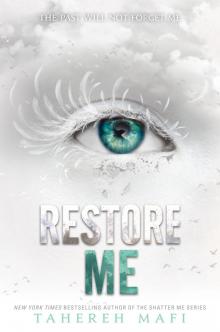 Restore Me
Restore Me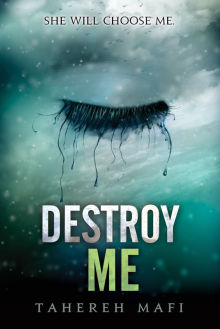 Destroy Me
Destroy Me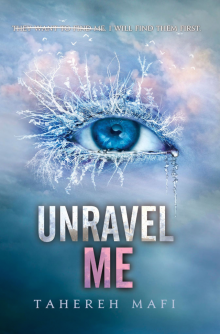 Unravel Me
Unravel Me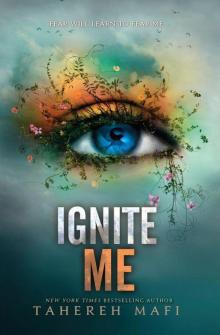 Ignite Me
Ignite Me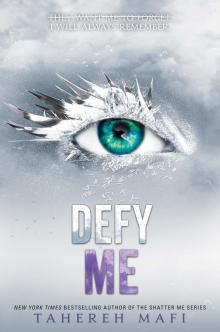 Defy Me
Defy Me Fracture Me
Fracture Me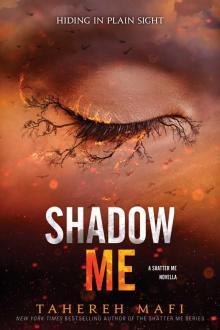 Shadow Me
Shadow Me Whichwood
Whichwood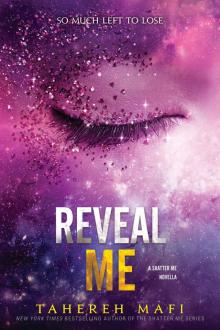 Reveal Me
Reveal Me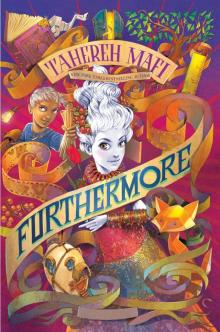 Furthermore
Furthermore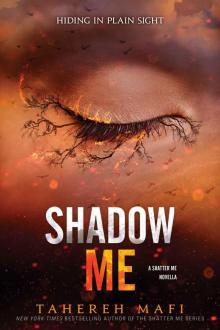 Shadow Me (Shatter Me Novella)
Shadow Me (Shatter Me Novella)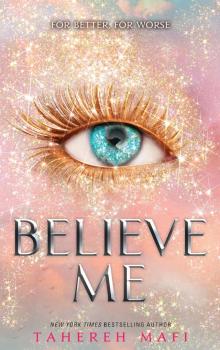 Believe Me
Believe Me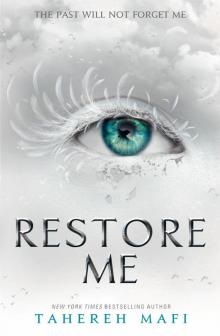 Restore Me (Shatter Me)
Restore Me (Shatter Me)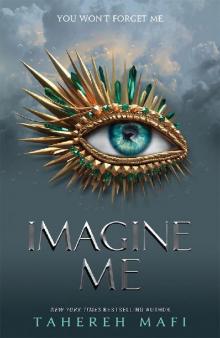 Imagine Me
Imagine Me An Emotion of Great Delight
An Emotion of Great Delight Find Me
Find Me A Very Large Expanse of Sea
A Very Large Expanse of Sea Unravel Me: The Juliette Chronicles Book 2
Unravel Me: The Juliette Chronicles Book 2